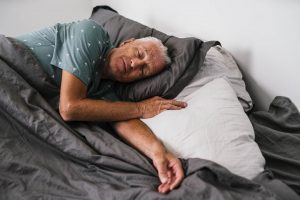New research investigates the link between inflammatory bowel disease (IBD) and insomnia, and offers solutions for what might help.
Professor Jane Andrews is a gastroenterologist at Central Adelaide Local Health Network (CALHN) and co-author on the recently-published paper.
“It’s now becoming clear that poor sleep is common in those with IBD and is associated with poor mental health and worse quality of life,” said Professor Andrews.
“We performed our study to explore ways to better manage and optimise quality of life and improve wellbeing of people with IBD.”
“The results confirm the high prevalence of sleep disturbance in people with IBD and reveal opportunities to improve sleep by addressing simple risk factors.”
Poor sleep and fatigue
IBD, including Crohn’s disease and ulcerative colitis, results from chronic inflammation of the gastrointestinal tract. Common symptoms include persistent diarrhea, abdominal pain, blood in the stools, weight loss and fatigue.
“People with IBD report a lot of fatigue, and because they are young, they spend many years with their disease and accompanying symptoms,” Professor Andrews said.
“Looking at ways to better manage quality of life issues is essential to the wellbeing of people with IBD.”
To explore insomnia and measures of quality of life in IBD, the SA-based researchers distributed an online questionnaire to 670 people with Crohn’s disease and ulcerative colitis. Questions focused on anxiety, depression, physical activity and disability.
Analysis confirmed that insomnia and associated disability are common in people with IBD. Significant insomnia was linked with active IBD, abdominal pain, anxiety and depression in the study group.
Chicken and egg situation
Professor Andrews said it’s not clear exactly how IBD leads to insomnia.
“This is a complex area, and it may be that IBD causes or worsens mental health issues, which then impact on sleep,” she said.
“And worry about incontinence is also likely to interrupt sleep”.
“It’s also possible that aspects of mental health put people more at risk of flares of their bowel inflammation – this is an area being actively explored with further research.”
Professor Andrews said the best way to improve sleep in people with IBD is to provide multidisciplinary care, involving experts in gastroenterology, mental health, sleep and psychology.
“Targeting risk factors such as active IBD, pain, anxiety and depression will likely improve sleep and have broader positive impacts,” she said.
“We’re now conducting further research to expand our understanding of IBD and quality of life issues, and to evaluate the success of treatment approaches to ensure we fix it – rather than just watch the issue.”
Read the research
This research was lead by Dr Alex Barnes, as part of his PhD studies, with co-authors from CALHN (Royal Adelaide Hospital and The Queen Elizabeth Hospital), Southern Adelaide Local Health Network, Flinders University and Medical Centre, and University of Adelaide.
Read the research paper here.
Photo by Ben Blennerhassett on Unsplash.



